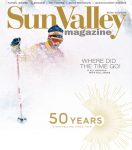Erik Rolf used to be an accountant. Thanks to the recession and his passion for an entirely different craft, that career got put on hold. Now Rolf builds custom bikes instead of balance sheets, having operated Alliance Bicycles out of a garage in the Ketchum industrial park for just over a year. His is the story of a Hailey kid gone corporate, who found the guts to leave it behind, pursue a dream and become a frame builder back home.
Shortly before completing his accounting degree at Montana State University, Rolf decided to invest in a custom mountain bike. He approached Carl Strong, of Bozeman, Montana’s, Strong Frames, to deliver on the graduation present, unaware that Strong’s shop would soon become his workplace. While his frame was under construction, Erik regularly kicked around Carl’s garage, openly debating the idea of learning the trade himself. Then, he said, “I tried to get an accounting job, but ended up working in a bike shop because the economy was so bad. At that point I figured that I was destined to work in the bike industry and emailed Carl about an apprenticeship.” Like any hands-on vocation, frame building is best learned under the guidance of an expert and few are more experienced than Strong, who’s built over 3,500 bikes in 17 years.

For the next two years, after landing a part-time accounting job, Rolf lead a double life in Bozeman. He laughed, “It was pretty funny building bikes two days a week and working the other three as an accounting analyst.”
But Rolf was a committed student, becoming obsessed with the process and the puzzle-like intricacies of building a custom bicycle. “After five o’clock, I’d go in sometimes and build frames until midnight. I built as many as I could and just kept buying more tube sets. Over and over,” he said. During his apprenticeship, Rolf not only learned the obvious industrial design elements of frame construction, but also how to spec riders and what it takes to turn tinkering into a viable business. He eventually built around 200 frames under Strong, all of which were squarely critiqued by the older craftsman.
Although Rolf admits that his job is essentially a creative outlet, he’s never taken an art class. He likes numbers and geometry; to him, custom bikes solve problems, whether the buyer’s issue is fit or handling or a combination of the two. Compared to the artsy creations of his urban and fixed gear counterparts, Rolf stated, “I think of my bikes more as forms of transportation.” Admittedly left-brained, he focuses on functionality and lets his customers pick the pretty colors. Rolf chuckles upon remembering how his earliest customers (all friends) would ride the unpainted prototypes he’d scrapped together in Strong’s workshop.

By the end of the apprenticeship, however, Rolf was ready to develop his own brand, Alliance Bicycles, and pursue the polished product he sells today. The move back to Idaho was natural, but not just because Sun Valley is a biker’s paradise. “If I went down the path of an accountant, I would never have a solid ski season again,” Erik claimed. “That’s why I live here: not because my job requires me to, but because I get to do what I want—and that’s ski and ride my bike.” One of the things that Rolf appreciates most about his business is not having to rely on local clientele. The demand, at least in North America, for hand-built bikes has never been higher and, although Alliance has a few frames around town, Rolf shipped most of this year’s 27 orders elsewhere. Why the rage to go custom? While every buyer is different, Rolf likes to think his clients essentially want the experience: discovering a builder, getting fitted, choosing tube sets, physically (or digitally) observing the frame’s construction and finally riding a bike that is inherently unique. “The customer gets to experience the process as much as they’re willing to,” he said. “I’ve had guys come in while I’m welding their bike and you really see it click for them.” Rolf puts so much emphasis on customer involvement that the name “Alliance” is actually a reference to the dynamic he hopes to have with every client. Erik explained, “As weird as it sounds, you’re really buying me.”
In the Alliance shop, one of Rolf’s welding masks has a sticker with a message: “Hate Your Job? Then Quit!” It’s the kind of advice that Rolf can offer from experience. He used to be an accountant, he used to have a boss, and he used to know nothing about fabricating tube sets. Now he happily supports himself by selling custom bike frames. “I’ve had a huge first year,” he says smiling, “and it’s all I could ask for.”

